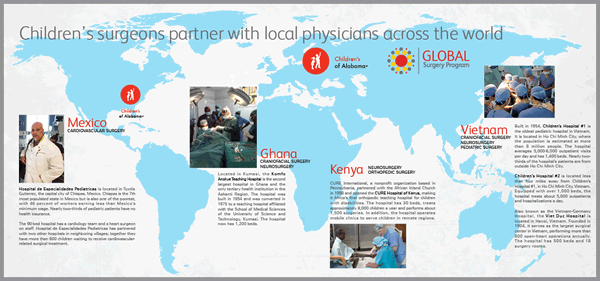Global Surgery Program
The Children’s of Alabama Global Surgery Program seeks to expand and enhance Children’s pediatric surgical and medical expertise through collaborative, reciprocal arrangements with medical communities in targeted parts of the world. Through this global initiative, surgeons travel to partner pediatric hospitals worldwide to perform surgery, educate, and provide expertise in the creation of standardized management protocols for complex surgical diseases. Additionally, surgeons and research coordinators from those partner institutions travel to Birmingham for training fellowships to advance their knowledge and skills, and to participate in research endeavors.
The program is newly formalized, building on the experience of surgeons from the divisions of general surgery, orthopedic surgery, plastic surgery, neurosurgery and cardiovascular surgery who have been making these overseas trips for years. Their work established the foundation of the program, but the need to coordinate the outreach within a structured initiative became increasingly apparent, both logistically and financially.
General pediatric surgeons Mike Chen, M.D., and his wife, Elizabeth Beierle, M.D., have made 10 trips to Vietnam since 2008, visiting children’s hospitals in Ho Chi Minh City, Hanoi and Da Nang. On a recent trip, they were joined by other general pediatric surgeons, pediatric urologists, anesthesiologists and support personnel. Vietnamese medical students served as interpreters. The group participated in a weekly tumor board conference and discussed care on 17 children, consulted in the pediatric surgery conference and reviewed care on over 30 children. They also operated on 16 children with complicated congenital anomalies, tumors and complex urological issues.
 Children’s surgeons currently work with partner hospitals in Kenya, Ghana, Vietnam and Mexico. Orthopedic surgeon Shawn Gilbert, M.D., performs surgery and trains Kenyan surgeons in complex procedures for spine and leg deformities at Kijabe CURE Hospital in Kenya. Craniofacial surgeons John Grant, M.D., and James Johnston, M.D., recently returned from a trip to the Komfo Anokye Teaching Hospital in Kumasi, Ghana where they worked with previous Global Surgery Fellows Solomon Yeboah, M.D., and Frank Boakye, M.D., to establish the first craniofacial program in Sub-Saharan Africa. Johnston and pediatric neurosurgeon Jerry Oakes, M.D., travel regularly to Ho Chi Minh City, Vietnam to work with previous Global Surgery Fellow Can Dang Do Thanh, M.D., to perform and teach complex brain tumor, craniofacial and neuroendoscopic surgery. Brandon Rocque, M.D., is working with current Global Surgery Fellow Lien Nguyen Duc, M.D., to establish a pediatric surgical epilepsy program at the National Viet Duc Hospital in Hanoi, Vietnam. Robert J. Dabal, M.D. travels with a multidisciplinary team from Children’s to perform and teach advanced cardiovascular surgery at the Hospital de Especialidades Pediatricas in Chiapas, Mexico.
Children’s surgeons currently work with partner hospitals in Kenya, Ghana, Vietnam and Mexico. Orthopedic surgeon Shawn Gilbert, M.D., performs surgery and trains Kenyan surgeons in complex procedures for spine and leg deformities at Kijabe CURE Hospital in Kenya. Craniofacial surgeons John Grant, M.D., and James Johnston, M.D., recently returned from a trip to the Komfo Anokye Teaching Hospital in Kumasi, Ghana where they worked with previous Global Surgery Fellows Solomon Yeboah, M.D., and Frank Boakye, M.D., to establish the first craniofacial program in Sub-Saharan Africa. Johnston and pediatric neurosurgeon Jerry Oakes, M.D., travel regularly to Ho Chi Minh City, Vietnam to work with previous Global Surgery Fellow Can Dang Do Thanh, M.D., to perform and teach complex brain tumor, craniofacial and neuroendoscopic surgery. Brandon Rocque, M.D., is working with current Global Surgery Fellow Lien Nguyen Duc, M.D., to establish a pediatric surgical epilepsy program at the National Viet Duc Hospital in Hanoi, Vietnam. Robert J. Dabal, M.D. travels with a multidisciplinary team from Children’s to perform and teach advanced cardiovascular surgery at the Hospital de Especialidades Pediatricas in Chiapas, Mexico.
The partner hospitals typically serve a very large regional population – 40 million in Ho Chi Minh City, for example -- and have a strong infrastructure and good facilities, but their staffs have not enjoyed the benefits of advanced training available in the United States. During the one-to-two-week trips, the Children’s surgeon will see patients in clinic alongside local physicians to determine which cases need immediate attention, which ones can wait and which will present a valuable educational experience for the local surgeon.
The reciprocal agreement with these foreign hospitals provides training opportunities to their physicians. Surgeons and residents are brought to Birmingham to observe procedures, discuss cases, and attend meetings and continuing education conferences. The usual stay is three months, during which time they are housed in apartments near the Children’s campus at the hospital’s expense.
Modern Technology Provides a Virtual Presence via VIPAR
A crucial component of the Children’s of Alabama global pediatric surgery outreach initiative is the use of technology by neurosurgeon James Johnston, M.D., that allows him to create a real-time presence in operating rooms on the other side of the world. Virtual Interactive Presence and Augmented Reality, or VIPAR, is an Internet-based telemedicine system that employs iPad and standard internet to stream video between Birmingham and remote sites. It was originally developed by Bart Guthrie, Professor of Neurosurgery at the University of Alabama at Birmingham, and has since been commercialized for use in multiple applications by the Department of Defense, Walmart, Medtronic and other large corporations.
How does VIPAR work? Surgeons at Children’s Hospital #2 in Ho Chi Minh City use an iPad to stream real-time images of an endoscopic third ventriculostomy with choroid plexus cauterization. Johnston follows the procedure from his tablet and can advise as needed. “I can interact with surgeons in Vietnam during the actual surgery,” he said. “It’s like I’m in the OR with them. We only use it for neurosurgery now, but we hope to adapt it to be valuable for other surgeries as well, specifically laparoscopy and microsurgery.” Details of the initiative, the first of its kind in the world, were recently published in World Neurosurgery.





